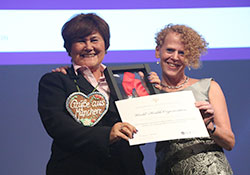WHO honoured with lung health award for air quality guidelines

European Respiratory Society
Copenhagen Munich, 6 September 2014
WHO has been awarded the annual European Lung Foundation award for improving the lung health of millions of people by providing outdoor air quality guidelines.
The WHO Regional Director for Europe, Zsuzsanna Jakab, received the award today (6 September 2014) at the annual European Respiratory Society (ERS) Congress in Munich, Germany.
During the inaugural year of the Healthy Lungs for Life campaign, and in celebration of its “Breathe clean air” message, the award recognizes WHO for its work in providing guidelines for outdoor air quality. This pioneering action is helping to improve the respiratory health of millions of people in Europe and across the globe.
“It is a great pleasure and honour for me to accept the 2014 European Lung Foundation award for WHO’s work in improving respiratory health through our outdoor air quality guidelines. We have come far. These guidelines – drawing on the invaluable expertise of partners including the European Lung Foundation – have led countries to establish national air quality standards, and the European Union to adopt the clean air directive,” said Ms Jakab.
Breathing clean air is fundamental to a healthy human population, yet air pollution poses a threat to the physical well-being of millions of people around the world. WHO estimates that air pollution was at the root of 7 million premature deaths in 2012, with 3.7 million of these being connected with poor outdoor air quality.
“Despite progress, 80% of people in the European Union live in cities where levels of air pollution still exceed our recommendations, and citizens in the most polluted cities could add 20 months on average to their life expectancy if the guidelines were followed. Health is everybody’s business. While we guide the design of effective measures and policies, the health sector must reach out, convincing policy-makers for transport, energy, agriculture, urban and land management to act appropriately, and improve the health and well-being of our citizens,” Ms Jakab added.
It is essential that policy-makers understand what constitutes a ”safe” level of air quality, so that air can be monitored with the population’s health in mind. Guidelines that can help to assess the public health risks of different amounts of air pollution are particularly valuable to the decision-making community.
WHO produced its first set of air quality guidelines in 1987, with subsequent updates in 2000 and 2005. A further revision will soon be initiated, in the context of new evidence. The guidelines are based on expert reviews of the latest scientific research on the health effects of air pollution, and aim to equip policy-makers, who have a range of different needs, with a solid evidence base that they can use to inform their decisions.
The latest guidelines, from 2005, cover the four main pollutants found in outdoor air: particulate matter, ozone, nitrogen dioxide and sulfur dioxide. A maximum recommended value for different time periods of exposure is assigned to each pollutant, so that countries know what they should be aiming for. In addition, the guidelines provide interim targets for each pollutant and exposure periods, including information on the health implications of each level, to support the most polluted countries with making incremental improvements.
European Lung Foundation Chair Monica Fletcher said: “We believe that the work of WHO is essential to help us protect the lungs of all citizens and especially those living with chronic lung conditions. The WHO guidelines represent a key milestone in the fight for clean air and I would like to offer my congratulations to Zsuzsanna and WHO for their outstanding work.”
Notes to editors
This year’s ERS Congress will see the launch of Healthy Lungs for Life; one of the largest-ever lung health campaigns, raising awareness of the importance of healthy lungs through a full range of events, projects and promotional activities.
In 2014, the theme is: “Breathe clean air”. Clean air means air free from particulate matter, pathogens, smoke and dangerous gases. We all have little control over the air that we breathe, but learning more about the quality of air and its impact can help people to find the best way to protect themselves. Find out more at www.healthylungsforlife.org.
See the WHO Regional Office for Europe website for WHO air-quality publications (http://www.euro.who.int/en/health-topics/environment-and-health/air-quality/publications).
A new study, published today in the European respiratory journal, has identified a strong link between higher levels of pollution and lung health of European citizens. Read the full study at http://erj.ersjournals.com/content/early/recent.
For further information, contact:
Press Office at ERS Congress in Munich, Germany
(Saturday, 6 September – Wednesday, 10 September 2014)
Lauren Anderson
Tel.: +49 17610399887
Email: lauren.anderson@europeanlung.org
David Sadler
Tel.: +49 17610572460



